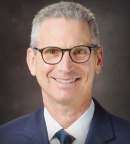
Alexander Y. Andreev-Drakhlin, MD

Daniel E. Epner, MD
As a high school student growing up in St Petersburg, Russia, I was so obsessed with chemistry that I begged my professor for extra problems to complete after school. When I rode the bus home on cold winter evenings, I traced chemical reactions with my finger in the frost on the window. By the time I arrived at my stop, the scribbling on the window must have looked like the undecipherable gibberish of a mad scientist. I later won a chemistry competition that offered a full scholarship to St Petersburg State University, but I chose to pursue medicine, as I have always been attracted by the allure of solving complex biomedical problems, as the brilliantly detached Dr. House did on television.
I was not fond of communication skills training during my internal medicine residency and was what educators call a “resistant learner.” Roleplay with standardized patients seemed contrived, and motivational interviewing seemed less like interviewing and more like manipulating. I felt like I was trying to trick the patient into giving up cigarettes rather than educating him and supporting his life choices. I already seemed to have a great rapport with the majority of my primary care clinic patients and didn’t think I needed training in this area.
Perception of Competence
In hindsight, my perception of competence probably resulted from the fact that I rarely broached emotionally charged topics. When I did, it was often to discuss code status with patients teetering on the precipice of death in the intensive care unit. This seemingly complex and heart-wrenching task ironically seemed straightforward to me, because I perceived that patients and families appreciated my honest, efficient, and sometimes blunt communication style. I was secretly proud of this style, which was devoid of “unnecessary” emotional statements, especially because I planned to pursue a career in translational science.
Roleplay also felt treacherous to me because I was concerned that I would drag the rest of the team down. I saw the facilitators’ faces light up with joy when my fellow residents offered great displays of emotional support, so I concluded that my direct style would go over poorly. Finally, I considered communication skills to be innate—some people are born effusive and bubbly, whereas others, like me, are naturally stoic and reserved. In retrospect, I realize that I did not know what I did not know.
My attitude was also heavily influenced by my upbringing in Russia. My perception is that Eastern Europeans generally, and Russians specifically, tend to be much less verbally effusive than Americans. Many Russians are suspicious of strong superlatives and wary of being manipulated or scammed. This is especially true for people who do not know one another well. Many Russian men are also expected to be stoic, so showing feelings is considered to be a sign of weakness and strong emotional statements are considered inauthentic. In addition, Russian doctors are frequently viewed purely as technical experts rather than idealized as renaissance men and women, as they often are on American television.
Deficiencies in Communication Skills
As a result of my world view, I continued to be complacent about my communication style and resistant to acquiring new skills as I completed residency and entered medical oncology fellowship. As time passed and I cared for highly vulnerable patients with cancer, I started to notice deficiencies in my ability to support them and often found myself unable to find the right words to respond to the most vexing questions. “Will I die before seeing my daughter get married?” “Doctor, I am scared. Is there any hope for me?” I felt that my natural communication style lacked a skill set for approaching these emotionally charged conversations.
As I moved through my training, I frequently observed the profound healing effects that the strong communication skills of others had on patients. I distinctly remember seeing a gynecologic oncologist repeatedly tell her patients, regardless of prognosis, “I will never abandon you. I will stick by you no matter what, whether or not things go well. I will always be your doctor from now on.” Her words always brought tears of gratitude to her patients’ eyes and to hers, and they even made me feel a little like crying.
“As I watched more and more faculty members during my oncology training, I began to appreciate the importance of balancing honesty with empathy [AYAD].”— Alexander Y. Andreev-Drakhlin, MD
Tweet this quote
However, despite clearly seeing the power of her words, I felt uncomfortable at the thought of saying them myself. I imagined my patients feeling abandoned as they desperately try to reach me for an urgent question when I am away on vacation or out of town at a meeting. Moreover, I thought that such expressive statements would not be consistent with my personality. It took a while to overcome my focus on the literal meaning of her words and instead start seeing the emotional message behind them—a solemn oath to support patients to the best of one’s ability for as long as possible and to honor the sacred bond that has always existed between patients and doctors.
Balancing Honesty With Empathy
As I watched more and more faculty members during my oncology training, I also began to appreciate the importance of balancing honesty with empathy. One challenge that repeatedly arose in my daily interactions with patients was the question of prognosis when the outlook is dismal. I was impressed by the approach of one of my attending physicians who cares predominantly for patients with advanced pancreatic cancer. He tells them: “You will probably have about X to Y months of good health,” with the numerical range depending on the specific circumstances. This phrase resonated with me because it offers a realistic estimate but also gets the patient to think about quality of life rather than an expiration date and gives room for more expression. It also does so with plain language, which helps patients understand the message.
Watching others during oncology fellowship has also demonstrated the power of projecting confidence. I noticed that patients often felt hopeful and relieved when my preceptors stressed that we have a highly committed, experienced, skilled, and knowledgeable team of clinicians who know how best to help them. Working at a renowned cancer center, my attending physicians also have the good fortune of being able to say that we can do as well, or better, than anyone in the world. Confidence seems particularly important as treatments begin to fail and patients approach the end of life. Their familiar rhythm of treatment every 2 to 4 weeks, followed by restaging studies every 2 to 3 months, followed by the same schedule with each successive salvage regimen, is eventually replaced by the great unknown for most patients.
So, my first several months of oncology fellowship stimulated me to appreciate the importance of taking responsibility, balancing honesty with empathy, and projecting confidence in our relationships with patients. I even acquired the rudiments of a new vocabulary and witnessed the power of empathy. Nonetheless, I still viewed these new phrases as a reflection of my attending physicians’ innate personal characteristics rather than as skills that can be developed. Seeing the gap between my communication style and those that I observed to be effective, I started to question whether my personality was simply a poor fit for taking care of oncology patients. Still, I wondered if there was some sort of a system that could help me fill this gap and learn how to respond to my patients with empathy and compassion.
Epiphany During a Workshop
After recently spending a month on the supportive/palliative medicine service toward the end of my first year of oncology fellowship, I gained some insight into this question. I had an epiphany during a highly interactive communication skills workshop near the beginning of the month. Another fellow presented the case of a middle-aged man with rectal cancer who was about to begin curative-intent chemoradiation only to be diagnosed with a synchronous incurable malignancy. The patient’s adult daughter approached the medical team outside the patient’s room to beseech them “not to tell my father he has incurable cancer.”
The group was then asked by Dr. Epner, the facilitator, to develop an approach to the conversation with the daughter and her father. My tendency until then was to do what I have seen others do so many times before by defaulting to a logical, legalistic argument, saying something like, “We have to tell your father about his diagnosis to respect his autonomy.” Instead, I learned that a request for nondisclosure may be viewed as an expression of strong emotions, including anxiety, sadness, grief, and fear. If so, then the best approach to such a request is first to find out what lies beneath by exploring the daughter’s concerns and then seize the resulting empathic opportunities. We then discussed the NURSE acronym for empathic continuer statements for emotional encounters: Name the emotion, Understand (validate) the emotion, Respect the emotion, Support the patient and family, and Explore the story to generate more empathic opportunities.1

I had heard of the NURSE acronym during my residency training, but the details never stuck. This time, however, after having cared for so many patients with advanced cancer and witnessing the power of empathy, the NURSE acronym resonated strongly with me. Acronyms also feel natural to me because they remind me of my method for surviving Russian literature classes in high school. My teachers said I was too literal, so one of them gave me a template to use for essays. This template was a game changer because it gave me the structure I was looking for. I used that template religiously so that each of my essays had essentially the same beginning and end, as well as number of sentences and paragraphs. This approach yielded a very respectable B or better on every essay through high school, as I was able to better interpret the story by sticking to my system, a literal framework. I viewed the NURSE acronym and associated phrases as a similar framework to help me respond to emotional encounters, whether explicit or implicit. Armed with this acronym, I finally had more than just a conceptual framework for responding to emotional encounters; I also had the actual words to go with it, words to memorize.
Revelations on Palliative Medicine Service
After the NURSE light bulb went on in my head, my next step was to expand my repertoire of empathic and exploratory phrases to memorize. There was no better place to do so than on the supportive/palliative medicine service. I feel lucky to have had a dedicated month of palliative care as a part of my medical oncology training. Most oncology fellows do not get the same opportunity, even though a recent study showed that oncology trainees considered the palliative care rotation to be the most important clinical experience of their fellowship.2 Each day on rounds in the palliative care unit, on the consult service, or in clinic, all I had to do was listen to faculty members and other members of the team speak with my patients, and my list of phrases grew.
After collecting several empathic and exploratory phrases by internalizing the NURSE system and carefully watching highly skilled communicators, I still did not feel as though I could fully embrace these words. Then, a man in his 60s with metastatic colon cancer really opened my eyes to the power of empathic statements.
The patient was responding to chemotherapy but nonetheless needed our help with cancer-related pain and other symptoms. He presented to the clinic alone. At what I thought was an opportune time, I asked him who was in his “close inner circle of people” to gauge how much support he had at home. He naturally spoke of his wife and then proudly described how his only daughter had become a chemical engineer.
Before my time on the palliative service, I may have quickly acknowledged this fact and moved on. I instead recalled the R in the NURSE acronym and paid my respects to him by saying how smart his daughter must be and how proud he must be of her accomplishments. He then smiled proudly and opened up more about his travels and life plans. At that moment, I felt like we had known each other for years. A few simple, heartfelt empathic statements allowed me to connect with this patient in a way I had never connected with previous patients.
More recently, I saw a woman in her early 20s with newly diagnosed acute leukemia and opioid dependence who wanted to leave the hospital against medical advice. She had just completed induction chemotherapy, and her treatment course was complicated by acute liver injury, leukopenia, and fever. Her mother, who understood that leaving would be incredibly dangerous, begged me to convince her to stay. I felt my heart pounding as I entered her room, as I realized the gravity of the situation. However, knowing that I now had the tools to approach this situation gave me confidence. Her jaundiced face looked sad and angry at the same time. I introduced myself and said: “This ordeal must be incredibly frustrating for you.” I then paused for a few seconds and continued: “It must be hard to be in the hospital for so long. I admire your strength fighting this awful disease.”
She started to cry and said: “Yeah, I need to get home now. I can’t stand being here.”
I continued: “I don’t blame you for feeling this way. Anyone would. Tell me more about what is most important to you.”
“I need to see my boy. He’s just 1 year old. I need to live for him.”
“I admire how much you love your son. We will provide you the best possible care so we can get you back home to him as soon as it is safe. We will always be here for you no matter what happens.”
After a few seconds, she regained her composure, dried her tears, asked a few medical questions, and asked me to turn off the lights on my way out. She had clearly decided to stay. As I left her room, her mother embraced me in a firm hug in the hallway and cried. She then whispered, “You saved my daughter’s life.” I didn’t have to say another word. The young woman’s condition improved over the next few weeks, and she was discharged home to continue treatment.
The Gift of Humanity
I now know that bedside manner is not some mysterious art form that only a few people possess at birth. Rather, healing relationships with patients are forged by key communication skills that can be taught, learned, and refined over time, much like playing tennis or performing open heart surgery. All learners can adapt these skills to their own styles, regardless of their career stage. What I previously thought were innate personality characteristics were instead the personification of a set of best practices, ones that I had already started to adopt. I realized that my initial rigidity and resistance to communication skills training, which had been based on the premise that it was incongruous with my personality and background, had prevented me from being the best doctor I could be for my patients.
These observations, along with some profound patient encounters, led me to see that we have the potential to offer our patients a gift that is arguably as powerful and meaningful as targeted therapy or immunotherapy: the gift of humanity. If I can undergo this transformation, anyone can.
Acknowledgment: The authors wish to thank Linda C. Epner, MD; Karthik Kota, MD; and Zieanna Chang, MD, for their thoughtful suggestions.
DISCLOSURE: Drs. Andreev-Drakhlin and Epner reported no conflicts of interest.
REFERENCES
1. Pollak KI, Arnold RM, Jeffreys AS, et al: Oncologist communication about emotion during visits with patients with advanced cancer. J Clin Oncol 25:5748-5752, 2007.
2. Reddy SK, Tanco K, Yennu S, et al: Integration of a mandatory palliative care education into hematology-oncology fellowship training in a comprehensive cancer center: A survey of hematology oncology fellows. J Oncol Pract 15:e934-e941, 2019.
At the time this article was originally published in the Journal of Clinical Oncology, Drs. Andreev-Drakhlin and Epner were practicing at The University of Texas MD Anderson Cancer Center, Houston.

